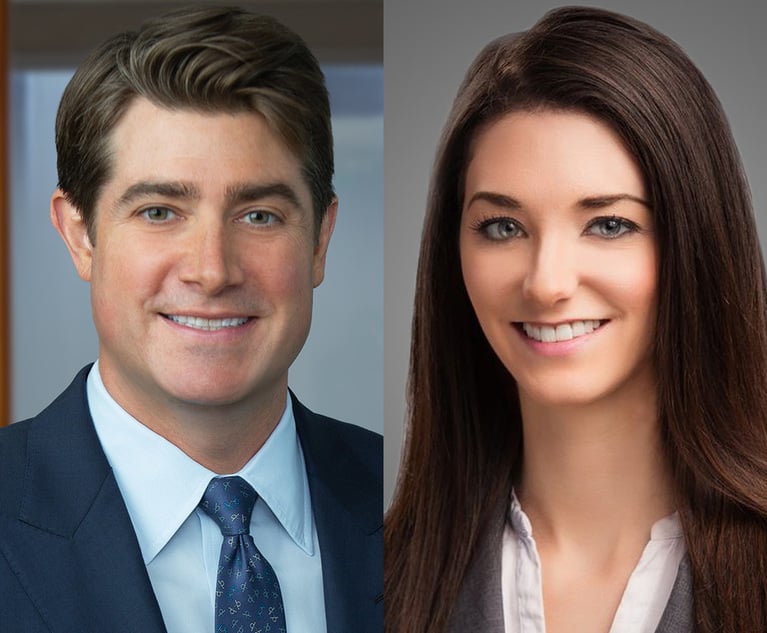Hiring Is Driven Not by Who You Know, but by Who You Are
Job seekers with traits such as integrity and adaptability are valued now, even more than GPA or law review or bar passage score.
July 22, 2020 at 01:32 PM
7 minute read
 Michael P. Maslanka, assistant professor of law, UNT Dallas College of Law.
Michael P. Maslanka, assistant professor of law, UNT Dallas College of Law.
Looking for a job as a lawyer? It has always been challenging and more so in the age of COVID-19. There is, though, a constant: Hiring is driven not by who you know but instead by who you are. Traits like character and integrity and adaptability count now rather than GPA or law review or bar passage score. Forty-plus years of practice/teaching (including two different tours of duty as a managing partner) convince me of this dynamic. Here then, is some guidance and suggestions.
But first, here is a mindset I ask the job seeker to embrace: Each of you is remarkable. This is not a mindless affirmation but rather a considered judgment. Keep it in mind as we work through the following guidance and suggestions.
Guidance No. 1: Eschew Best Practices
Best practices consist of useless and harmful homogenized advice. In short, mediocre counsel that is summed and then averaged and passed off as wisdom. By way of example; a resume should only be one page; who says? If there is useful information to deliver, go to two pages, (more on what useful looks like in a minute). This wrongheaded idea is partially based on the misguided belief that the resume's purpose is to inform and not to persuade.
- Suggestion: Keep social distance from "Best Practices."
Guidance No. 2: People Are Hired, Resumes Are Not
What should a resume include that is now left off? Life experiences that made you into who you are. I was having breakfast with a student pupil member of my Inn of Court. Her resume was pure academics. Period. Some probing, though, revealed that her parents owned a small telecommunications company, that she drove the delivery van in the heat of an Alabama summer and that she and her sister had to tear apart, with crowbars, an aged warehouse that her parents bought. She revised her resume to include these life experiences and was asked one key question at her interview: "Children whose parents own a business are either the most spoiled or the most hardworking. Which are you?" She parlayed that foothold job into a successful sole practice in commercial real estate.
- Suggestion: Never forget that resumes are about soul and spirit and not paper and ink.
Guidance No. 3: Be Yourself
As Oscar Wilde remarked, "You have no choice but to be yourself because everyone else is taken." Let the true you shine through and not some pale version of who you think you should be. I write letters of recommendation for the first and not the second. Here are two examples:
Student makes it to the Sweet Sixteen in oral argument competition, but in the final round nerves catch up and the student, hyperventilated, makes it to the end of the argument but goes no further. My letter praises all the regular stuff about hard work etc., and I then relate this episode and write, "I have practiced law for 49 years, and the student's performance was one of the bravest things I have ever seen."
The second letter involves a student in a challenging first-year course. I watched her interactions with others and how she treated them with respect and help and decency in what can be a super-competitive environment. The end of my letter summarized what I saw and then states, "While she received a B+ as a student, she gets an A+ as a human being."
- Suggestion: Lawyers hire foxhole lawyers. Be a foxhole lawyer.
Guidance No. 4: Maximize Your Real Estate
Your resume should read like tightly reasoned opening statements and closing argument. No wasted words, needless throat-clearing and no wasted space. So, delete the reference list or the language about references that can be supplied upon request. Bullet points for facts and check marks for conclusions are effective visuals. One important frame, though, is to limit them to three per caption. Why? We all know intuitively the rule of three from "life, liberty and the pursuit of happiness" to "blood, sweat and tears." Cognitive research demonstrates that three is ideal, with two being too diluted and four being too dense.
And, like any good argument, do not bury your point. I saw one resume that grouped everything together, like a ball of sushi rice, several awards that the person received. The most prestigious was buried in the middle, treated like all the others and, as a result, had no punch. I suggested the resume writer pull it out, list only it as an award and then describe what is was and how it was awarded. By the way, don't assume the reader knows what the award is about, which is akin to a junior lawyer assuming the jury knows all about his case. Here, I knew the importance of the award because I teach at the law school. Otherwise, I would be clueless.
- Suggestion: Effective persuasion is about subtraction, not addition.
Guidance No. 5: Show Me, Don't Tell Me
"I am really interested in employment law," opines the job seeker. For me, this is a sentence fragment. It needs to be followed with one of my favorite words, "because." Are you reading employment law blogs? Seeking mentorship from employment lawyers? Assuming leadership positions with employment law organizations? (By the way, wasted real estate is listing which groups to which you belong but do nothing but pay fees.)
You see this principle at work in interviews as well. Instead of asking whether you are a tough lawyer who cares about individuals, one plaintiffs firm asks whether you ever punched someone and why? One truthful answer related to me by a friend was, "Yes, when I was 12, because he was picking on a smaller child." Too shocked by the question to say anything but the truth, she was offered a job a week later.
- Suggestion: Live your dream, do not sleepwalk through it.
But these elements need to be tied together don't they? So, what's the secret sauce? The job seeking formula akin to the Coke formula? The X-factor? Here it is, courtesy of a book, "The Drunkard's Walk: How Randomness Rules Our Lives," by Leonard Mlodinow. He explains that chance and circumstance rule our lives, but that the more involved we are with life, then the more that chance and circumstance favors us. He writes that what is 100% in our control are the number of times we go to bat, the variety of people we meet, and the considered risks that we take. As I tell students, "You must be in the water to catch the wave." Surf's up!
Michael P. Maslanka is an assistant professor of law at University of North Texas at Dallas College of Law. His email is [email protected].
This content has been archived. It is available through our partners, LexisNexis® and Bloomberg Law.
To view this content, please continue to their sites.
Not a Lexis Subscriber?
Subscribe Now
Not a Bloomberg Law Subscriber?
Subscribe Now
NOT FOR REPRINT
© 2025 ALM Global, LLC, All Rights Reserved. Request academic re-use from www.copyright.com. All other uses, submit a request to [email protected]. For more information visit Asset & Logo Licensing.
You Might Like
View All
Big Law Firms Sheppard Mullin, Morgan Lewis and Baker Botts Add Partners in Houston
5 minute read
What Happens When Lateral Partners’ Guaranteed Compensation Ends?

Houston-Based Law Firm Overcomes Defamation Suit for Website Warning
3 minute readTrending Stories
- 1Thursday Newspaper
- 2Public Notices/Calendars
- 3Judicial Ethics Opinion 24-117
- 4Rejuvenation of a Sharp Employer Non-Compete Tool: Delaware Supreme Court Reinvigorates the Employee Choice Doctrine
- 5Mastering Litigation in New York’s Commercial Division Part V, Leave It to the Experts: Expert Discovery in the New York Commercial Division
Who Got The Work
J. Brugh Lower of Gibbons has entered an appearance for industrial equipment supplier Devco Corporation in a pending trademark infringement lawsuit. The suit, accusing the defendant of selling knock-off Graco products, was filed Dec. 18 in New Jersey District Court by Rivkin Radler on behalf of Graco Inc. and Graco Minnesota. The case, assigned to U.S. District Judge Zahid N. Quraishi, is 3:24-cv-11294, Graco Inc. et al v. Devco Corporation.
Who Got The Work
Rebecca Maller-Stein and Kent A. Yalowitz of Arnold & Porter Kaye Scholer have entered their appearances for Hanaco Venture Capital and its executives, Lior Prosor and David Frankel, in a pending securities lawsuit. The action, filed on Dec. 24 in New York Southern District Court by Zell, Aron & Co. on behalf of Goldeneye Advisors, accuses the defendants of negligently and fraudulently managing the plaintiff's $1 million investment. The case, assigned to U.S. District Judge Vernon S. Broderick, is 1:24-cv-09918, Goldeneye Advisors, LLC v. Hanaco Venture Capital, Ltd. et al.
Who Got The Work
Attorneys from A&O Shearman has stepped in as defense counsel for Toronto-Dominion Bank and other defendants in a pending securities class action. The suit, filed Dec. 11 in New York Southern District Court by Bleichmar Fonti & Auld, accuses the defendants of concealing the bank's 'pervasive' deficiencies in regards to its compliance with the Bank Secrecy Act and the quality of its anti-money laundering controls. The case, assigned to U.S. District Judge Arun Subramanian, is 1:24-cv-09445, Gonzalez v. The Toronto-Dominion Bank et al.
Who Got The Work
Crown Castle International, a Pennsylvania company providing shared communications infrastructure, has turned to Luke D. Wolf of Gordon Rees Scully Mansukhani to fend off a pending breach-of-contract lawsuit. The court action, filed Nov. 25 in Michigan Eastern District Court by Hooper Hathaway PC on behalf of The Town Residences LLC, accuses Crown Castle of failing to transfer approximately $30,000 in utility payments from T-Mobile in breach of a roof-top lease and assignment agreement. The case, assigned to U.S. District Judge Susan K. Declercq, is 2:24-cv-13131, The Town Residences LLC v. T-Mobile US, Inc. et al.
Who Got The Work
Wilfred P. Coronato and Daniel M. Schwartz of McCarter & English have stepped in as defense counsel to Electrolux Home Products Inc. in a pending product liability lawsuit. The court action, filed Nov. 26 in New York Eastern District Court by Poulos Lopiccolo PC and Nagel Rice LLP on behalf of David Stern, alleges that the defendant's refrigerators’ drawers and shelving repeatedly break and fall apart within months after purchase. The case, assigned to U.S. District Judge Joan M. Azrack, is 2:24-cv-08204, Stern v. Electrolux Home Products, Inc.
Featured Firms
Law Offices of Gary Martin Hays & Associates, P.C.
(470) 294-1674
Law Offices of Mark E. Salomone
(857) 444-6468
Smith & Hassler
(713) 739-1250







